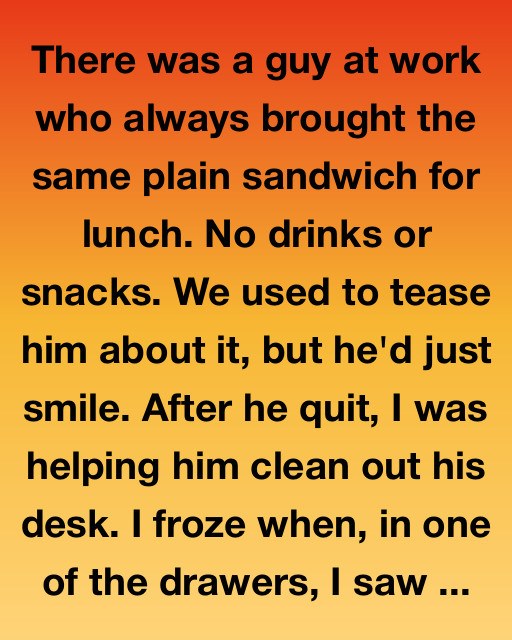At work, there was a quiet man named Paul. You know the type — the one who moves through the office unnoticed, polite, steady, invisible to most. He ate the same plain sandwich every day. No chips, no drink, no variation. Just a simple peanut butter and jelly sandwich wrapped in wax paper. Sometimes we teased him, gently, the way coworkers do. He would just smile, shrug, and go back to eating.
When he quit, it shocked everyone. No big announcement, no farewell email. He told the manager and packed his cubicle. I happened to be nearby and offered to help. He thanked me with that same quiet smile. Expecting to find only pens and sticky notes, I opened his desk drawer and discovered a thick bundle of children’s drawings held together by a stretched rubber band.
Hearts, stick-figure families, little kids holding hands. One showed a sandwich floating in the air like a gift, handed to a line of children. Another had a speech bubble: “I’m not hungry today. Thank you, Mr. Paul.”
It hit me.
Paul never talked about having kids. Never showed photos. Never mentioned nieces or nephews. Just routine, quiet kindness, and his “boring” sandwich. When I asked later, he didn’t explain. He simply said, “Ever been to the West End Library around six? Come by sometime.”
A few days later, I went. I expected something small, maybe simple.
Instead, Paul stood by the library entrance with a cooler bag and neat rows of brown paper sacks. Around fifteen children — some homeless, some struggling — waited quietly. He handed each a bag with steady hands and kind words. No bragging. No preaching. No expectations.
“Most of them don’t get dinner,” he said. “So I make sure they get one meal a day.”
The plain sandwiches he ate at work weren’t his lunch. They were test runs. He made the same sandwiches every morning for the kids — familiar, cheap, filling, easy to duplicate. “PB&J,” he said. “No one complains. Some say it’s the best part of their day.”
All those jokes about his “boring lunch” stung in hindsight.
I started helping him — carrying bags, handing out food, making small talk. He never asked for help, but he let me. One morning, while making sandwiches together, I finally asked why.
“I grew up in foster care,” he said quietly. “Some nights, I didn’t eat. You learn how small you can feel. Hungry and invisible… that sticks with you.”
It wasn’t a speech, just the truth. For Paul, giving sandwiches wasn’t charity. It was healing a wound that never fully closed.
One week, he didn’t show up. No texts, no calls. I waited at the library with the sandwiches he had prepped. A little girl tugged my sleeve: “Is Mr. Sandwich Man okay?”
Two days later, the hospital called — I was his emergency contact. He’d collapsed from exhaustion and stress. In his hospital bed, small, pale, embarrassed — he still smiled.
“Did you bring sandwiches?” he whispered.
I had. I promised to keep it going until he recovered.
At first, it was just me. Slowly, coworkers joined in. Fridays became “Sandwich Fridays.” We filled the break room with bread, peanut butter, jelly, paper bags, even little superhero sandwich stickers. Paul would have hated the attention, but he would have loved the intention.
When he recovered, he didn’t return to work. Instead, he founded a nonprofit: One Meal Ahead. The name came from his foster dad: “You don’t have to fix everything. Just be one meal ahead of the worst day.”
Paul never bragged, never sought thanks, never tried to be a hero. He quietly built a bridge from his own childhood struggles to someone else’s needs.
And sometimes, when I make sandwiches with the Friday crew, I think about all the jokes we made about his plain lunches — how blind we were, how easily we missed the quiet miracle happening right in front of us.
Heroes don’t announce themselves. They don’t give speeches. Sometimes, they just carry a cooler bag, a sandwich, and a smile — every day — because they know exactly how it feels to be hungry and invisible, and they refuse to let anyone else feel that way if they can help.
